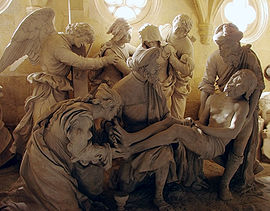Saint-Mihiel
Appearance
Saint-Mihiel | |
|---|---|
 Entombment of Christ, sculpture by Ligier Richier, in the Church of St. Étienne, in Saint-Mihiel | |
| Coordinates: 48°53′21″N 5°32′37″E / 48.8892°N 5.5436°E | |
| Country | France |
| Region | Grand Est |
| Department | Meuse |
| Arrondissement | Commercy |
| Canton | Saint-Mihiel |
| Intercommunality | Sammiellois |
| Government | |
| • Mayor (2008–2014) | Alain Perelle |
| Area 1 | 33 km2 (13 sq mi) |
| Population (2021)[1] | 3,924 |
| • Density | 120/km2 (310/sq mi) |
| Time zone | UTC+01:00 (CET) |
| • Summer (DST) | UTC+02:00 (CEST) |
| INSEE/Postal code | 55463 /55300 |
| Elevation | 228 m (748 ft) |
| 1 French Land Register data, which excludes lakes, ponds, glaciers > 1 km2 (0.386 sq mi or 247 acres) and river estuaries. | |
Saint-Mihiel is a commune in the Meuse department in Grand Est in north-eastern France.
Geography
Saint-Mihiel lies on the banks of the Meuse River.
History
A Benedictine abbey was established here in 708 or 709 by Count Wulfoalde and his wife Adalsinde. The library, containing over 9,000 works, is still on the original site.
During World War I, Saint-Mihiel was captured by the Germans in 1914, and was recaptured during the Battle of Saint-Mihiel from 12 September to 19 September 1918.
Features
Saint-Mihiel is known for its sculptures by Renaissance sculptor Ligier Richier (1500–1567).
Saint-Mihiel serves both as the starting and ending point of the 2014 video game Valiant Hearts: The Great War.
See also
References
- ^ "Populations légales 2021" (in French). The National Institute of Statistics and Economic Studies. 28 December 2023.
External links
Wikimedia Commons has media related to Saint-Mihiel.
- Official website.
- World War 1 Memorials and Cemeteries in the St Mihiel salient
- by Ligier Richier in the St Mihiel area




